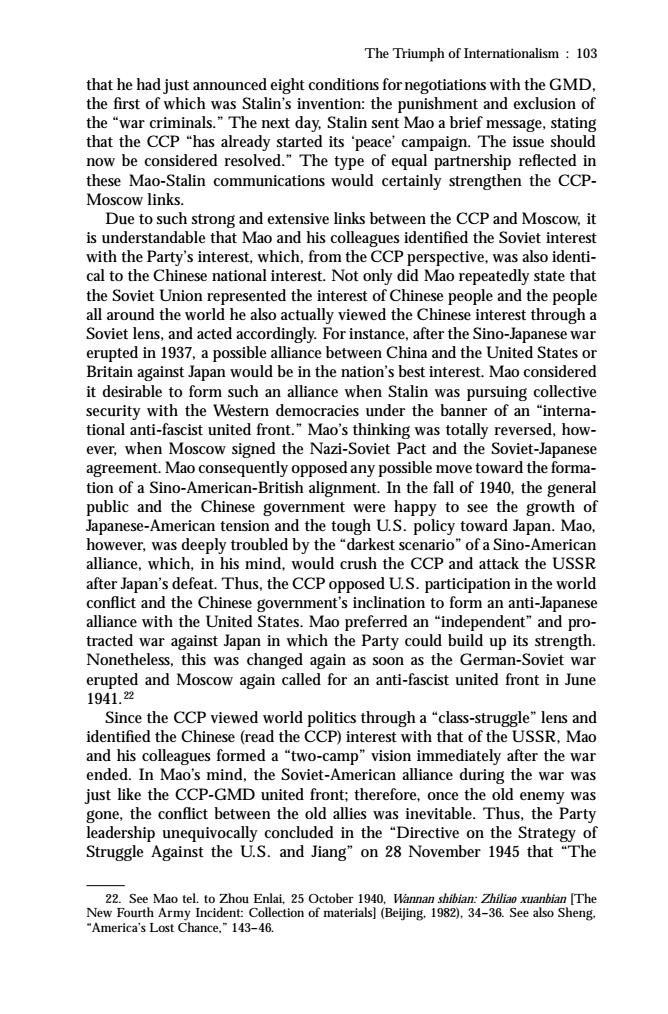正在加载图片...

The Triumph of Internationalism 103 that he had just announced eight conditions for negotiations with the GMD. the first of which was Stalin's invention:the punishment and exclusion of the "war criminals."The next day,Stalin sent Mao a brief message,stating that the CCP "has already started its 'peace'campaign.The issue should now be considered resolved."The type of equal partnership reflected in these Mao-Stalin communications would certainly strengthen the CCP- Moscow links. Due to such strong and extensive links between the CCP and Moscow,it is understandable that Mao and his colleagues identified the Soviet interest with the Party's interest,which,from the CCP perspective,was also identi- cal to the Chinese national interest.Not only did Mao repeatedly state that the Soviet Union represented the interest of Chinese people and the people all around the world he also actually viewed the Chinese interest through a Soviet lens,and acted accordingly.For instance,after the Sino-Japanese war erupted in 1937,a possible alliance between China and the United States or Britain against Japan would be in the nation's best interest.Mao considered it desirable to form such an alliance when Stalin was pursuing collective security with the Western democracies under the banner of an "interna- tional anti-fascist united front."Mao's thinking was totally reversed,how- ever,when Moscow signed the Nazi-Soviet Pact and the Soviet-Japanese agreement.Mao consequently opposed any possible move toward the forma- tion of a Sino-American-British alignment.In the fall of 1940,the general public and the Chinese government were happy to see the growth of Japanese-American tension and the tough U.S.policy toward Japan.Mao, however,was deeply troubled by the"darkest scenario"of a Sino-American alliance,which,in his mind,would crush the CCP and attack the USSR after Japan's defeat.Thus,the CCP opposed U.S.participation in the world conflict and the Chinese government's inclination to form an anti-Japanese alliance with the United States.Mao preferred an "independent"and pro- tracted war against Japan in which the Party could build up its strength. Nonetheless,this was changed again as soon as the German-Soviet war erupted and Moscow again called for an anti-fascist united front in June 1941.2 Since the CCP viewed world politics through a "class-struggle"lens and identified the Chinese(read the CCP)interest with that of the USSR,Mao and his colleagues formed a "two-camp"vision immediately after the war ended.In Mao's mind,the Soviet-American alliance during the war was just like the CCP-GMD united front;therefore,once the old enemy was gone,the conflict between the old allies was inevitable.Thus,the Party leadership unequivocally concluded in the "Directive on the Strategy of Struggle Against the U.S.and Jiang"on 28 November 1945 that "The 22.See Mao tel.to Zhou Enlai,25 October 1940,Wannan shibian:Zhiliao xuanbian [The New Fourth Army Incident:Collection of materials](Beijing.1982),34-36.See also Sheng. "America's Lost Chance."143-46.The Triumph of Internationalism : 103 that he had just announced eight conditions fornegotiations with the GMD, the first of which was Stalin’s invention: the punishment and exclusion of the “war criminals.” The next day, Stalin sent Mao a brief message, stating that the CCP “has already started its ‘peace’ campaign. The issue should now be considered resolved.” The type of equal partnership reflected in these Mao-Stalin communications would certainly strengthen the CCPMoscow links. Due to such strong and extensive links between the CCP and Moscow, it is understandable that Mao and his colleagues identified the Soviet interest with the Party’s interest, which, from the CCP perspective, was also identical to the Chinese national interest. Not only did Mao repeatedly state that the Soviet Union represented the interest of Chinese people and the people all around the world he also actually viewed the Chinese interest through a Soviet lens, and acted accordingly. Forinstance, after the Sino-Japanese war erupted in 1937, a possible alliance between China and the United States or Britain against Japan would be in the nation’s best interest. Mao considered it desirable to form such an alliance when Stalin was pursuing collective security with the Western democracies under the banner of an “international anti-fascist united front.” Mao’s thinking was totally reversed, however, when Moscow signed the Nazi-Soviet Pact and the Soviet-Japanese agreement. Mao consequently opposed any possible move toward the formation of a Sino-American-British alignment. In the fall of 1940, the general public and the Chinese government were happy to see the growth of Japanese-American tension and the tough U.S. policy toward Japan. Mao, however, was deeply troubled by the “darkest scenario” of a Sino-American alliance, which, in his mind, would crush the CCP and attack the USSR after Japan’s defeat. Thus, the CCP opposed U.S. participation in the world conflict and the Chinese government’s inclination to form an anti-Japanese alliance with the United States. Mao preferred an “independent” and protracted war against Japan in which the Party could build up its strength. Nonetheless, this was changed again as soon as the German-Soviet war erupted and Moscow again called for an anti-fascist united front in June 1941.22 Since the CCP viewed world politics through a “class-struggle” lens and identified the Chinese (read the CCP) interest with that of the USSR, Mao and his colleagues formed a “two-camp” vision immediately after the war ended. In Mao’s mind, the Soviet-American alliance during the war was just like the CCP-GMD united front; therefore, once the old enemy was gone, the conflict between the old allies was inevitable. Thus, the Party leadership unequivocally concluded in the “Directive on the Strategy of Struggle Against the U.S. and Jiang” on 28 November 1945 that “The 22. See Mao tel. to Zhou Enlai, 25 October 1940, Wannan shibian: Zhiliao xuanbian [The New Fourth Army Incident: Collection of materials] (Beijing, 1982), 34–36. See also Sheng, “America’s Lost Chance,” 143–46